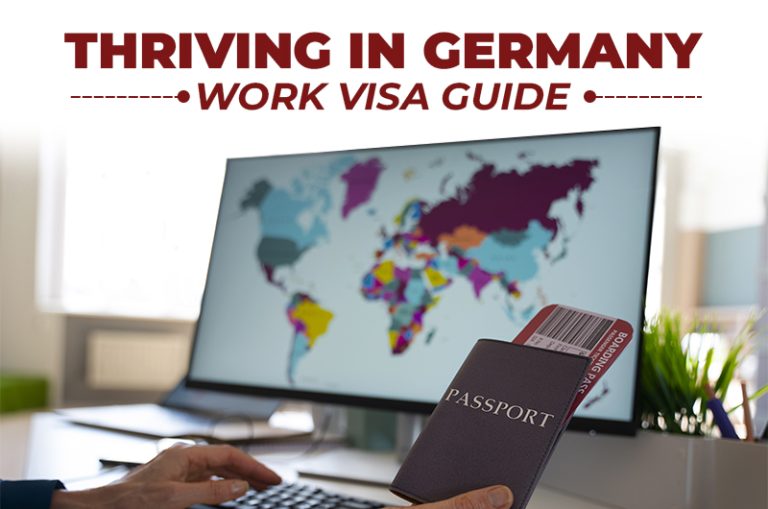Germany, the land of efficiency and innovation, beckons skilled professionals from around the world. Its robust economy and thriving job market offer enticing opportunities for those seeking a fulfilling career. But for non-EU citizens, navigating the process of obtaining a German work permit can seem like venturing into a bureaucratic labyrinth. Fear not, aspiring professionals! This blog post serves as your roadmap, deconstructing the complexities and guiding you through the essential steps of securing your German work permit.
Understanding the Different Types of Work Permits:
CHECK Building Your Career in Germany: Jobs at Julius Berger
Germany offers a variety of work permits, each catering to specific situations. Here’s a breakdown of the most common types:
- The Employment Permit (Beschäftigungserlaubnis): This permit is required for most non-EU citizens who wish to work in Germany. It’s typically issued for a specific job with a specific employer and needs to be renewed if you change jobs.
- The EU Blue Card: This permit is designed to attract highly skilled workers from outside the EU. To qualify, you’ll need a relevant university degree, at least three years of work experience in your field, and a job offer with a salary that meets or exceeds a certain threshold (currently €56,400 per year as of 2023). The Blue Card offers several advantages, including the ability to bring your spouse and children to Germany and easier access to permanent residency.
- The Freelance Visa: This visa allows you to work as a freelancer in Germany. To qualify, you’ll need to demonstrate expertise in your field, a viable business plan, and sufficient financial resources to support yourself.
- The Job Seeker Visa: This visa allows you to enter Germany and search for a job for a limited period (typically six months). It’s not a work permit, but it can be a helpful stepping stone if you have a strong chance of securing employment within that timeframe.
APPLY Process now at FULL Guide to German Visas for Work and Study
Who Needs a Work Permit?
Generally, any non-EU citizen who wishes to work in Germany will require a work permit. However, there are some exceptions. For example, citizens of certain EU/EEA countries (European Economic Area) are free to work in Germany without a permit. Additionally, some specific occupations, such as researchers or university lecturers, might have simplified procedures for obtaining work authorization.
The Application Process:
The application process for a German work permit typically involves these steps:
- Finding a Job Offer: Securing a job offer from a German employer is the first crucial step. The employer will usually initiate the work permit application process on your behalf.
- Gathering Required Documents: This typically includes your passport, proof of qualifications, a criminal background check, proof of health insurance, and a completed work permit application form.
- Submitting the Application: The employer will submit the application to the Federal Employment Agency (Bundesagentur für Arbeit) in Germany.
- Interview (Optional): In some cases, the authorities might request an interview to assess your qualifications and suitability for the position.
- Processing Time and Permit Issuance: Processing times can vary depending on your specific situation and the workload of the authorities. However, you can expect to wait anywhere from a few weeks to several months.
Additional Considerations:
- Language Skills: While German language proficiency is not always mandatory, it can significantly improve your chances of securing a job and navigating daily life in Germany. Consider taking German language courses to enhance your application and overall experience.
- Cost of Obtaining a Permit: There are associated fees for applying for a work permit. The employer typically covers these costs, but it’s advisable to clarify this beforehand.
- Visa Requirements: Depending on your nationality, you might need to obtain a visa to enter Germany while your work permit application is being processed.
CHECK Building Your Career in Germany: Jobs at Julius Berger
Finding Help and Resources:
The process of obtaining a German work permit can be complex. Here are some resources to help you navigate the maze:
- The Federal Employment Agency (Bundesagentur für Arbeit): https://www.arbeitsagentur.de/en (German only)
- The German Missions Abroad: Many German embassies and consulates offer assistance with visa and work permit applications.
- Immigration Lawyers: Consulting an immigration lawyer can be particularly helpful if your situation is complex.
Conclusion:
Obtaining a German work permit requires planning, preparation, and a good understanding of the different categories and application processes. However, with the right information and resources, you can navigate the complexities and unlock the exciting career opportunities that Germany has to offer. So, take a deep breath, gather your documents, and embark on your German work permit journey. With dedication and perseverance, you can transform the maze into a clear path towards a fulfilling career in Germany. Remember, this blog post serves as a general guide, and specific requirements might vary depending on your individual circumstances.
APPLY Process now at FULL Guide to German Visas for Work and Study
Living and Working in Germany:
Once you secure your work permit, Germany welcomes you with a vibrant culture, rich history, and breathtaking landscapes. Here are some additional resources to help you settle in:
- Make it in Germany: https://www.make-it-in-germany.com/en/visa-residence/skilled-immigration-act (English website with information on living and working in Germany)
- The Federal Office for Migration and Refugees (BAMF): https://www.bamf.de/EN/Startseite/startseite_node.html (German only, but offers some resources in English)
- Local expat forums and communities: Connecting with other expats can provide invaluable support and insights into daily life in Germany.
Embrace the Adventure:
Germany awaits with its open arms and a plethora of opportunities. By understanding the work permit process, taking the necessary steps, and embracing the cultural nuances, you can turn your dream of working in Germany into a reality. So, pack your bags, unleash your professional spirit, and get ready to experience the wonders of “Deutschland” – with your work permit proudly in hand!

